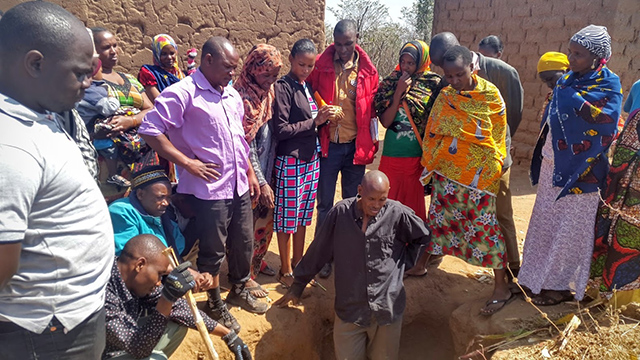Tanzanian Farmers Boost Diets, Mental Health with Sustainable Methods
Peer mentorship reduces food insecurity and gender inequity
Get all our news
The study is a microcosm of how the interconnected global challenges of undernutrition, social inequity, and sustainable food production can be addressed concurrently and harmoniously.”
Sera Young
IPR anthropologist

Farmers and agricultural researchers discuss a composting technique during training using the participatory Farming for Change curriculum.
A groundbreaking study finds that an innovative practice of farmers mentoring farmers improved children’s dietary diversity, cut the proportion of families who were food insecure, and reduced depression among women in one of the poorest areas of Tanzania. The program is the first agricultural intervention known to have an impact on women’s mental health.
Co-led by IPR anthropologist Sera Young, researchers from Northwestern, Cornell University, and Nelson Mandela African Institution of Science and Technology implemented a farmer-to-farmer training modeled on a successful one in Malawi.
“The study is a microcosm of how the interconnected global challenges of undernutrition, social inequity, and sustainable food production can be addressed concurrently and harmoniously,” Young said.
Focused on nearly 600 smallholder farmers with young children, the program centered on farmers training other farmers in sustainable practices that improve soil, increase biodiversity, and crop productivity. The program also emphasized improving gender equity and women’s mental health. In participating households, women gained more control over decisions, and men became more involved in childcare and household tasks.
“A key aspect of the participatory approach was its emphasis on improving gender equity and mental health,” said the study’s lead author Marianne V. Santoso, a postdoctoral research fellow in anthropology. “In the intervention households, women had more to say about how household income was spent, and men were more involved in household chores and childcare.”
The program reduced by 11.6 percentage points the number of women experiencing depressive symptoms, a large effect. It also improved children’s dietary diversity by nearly one whole food group and reduced the proportion of families who were food insecure by 12.5 percentage points.
Two billion people experienced food insecurity, and 144 million children under the age of five were malnourished in 2019, according to a report published in 2020 by the Food and Agriculture Organization of the United Nations. The project addresses the global problem of food insecurity by reaching a key group poised to make a difference—smallholder farmers.
The project builds on the work of co-principal investigator Rachel Bezner Kerr, professor of global development in the College of Agriculture and Life Sciences at Cornell. Kerr has been using a peer learning approach for sustainable farmland food security with a farmers organization in Malawi for 20 years.
The Tanzanian study extended this work by testing if this approach could work in a new climatological and cultural environment. It rigorously evaluated the impacts on outcomes like food security, nutrition, and women’s empowerment using a randomized study design.
“We are hopeful that this approach can be replicated in other settings,” Young said. “The curriculum has already been translated into several languages commonly spoken in southern and eastern Africa. We also hope that sustainable farming specifically and participatory approaches more generally will become more mainstream in nutrition interventions.”
Read the full study in the Journal of Nutrition and the preprint of a second paper focused on gender equity data and mental health outcomes.
Sera Young is associate professor of anthropology and global health and an IPR fellow.
Photo credit: Marianne V. Santoso
Published: May 11, 2021.


